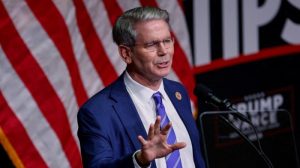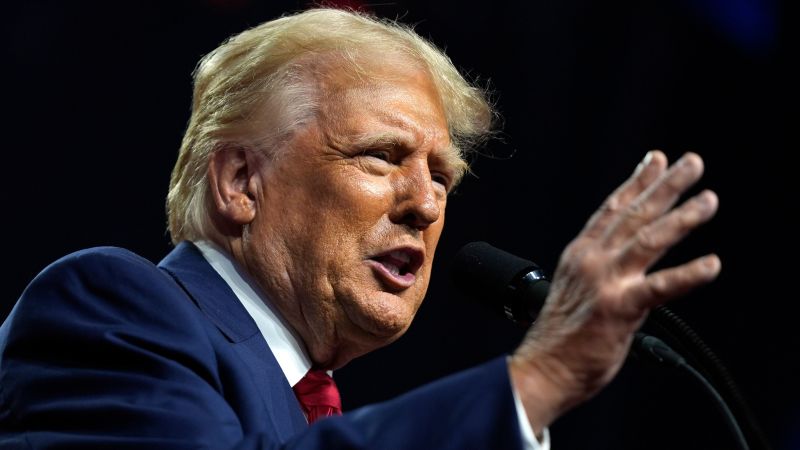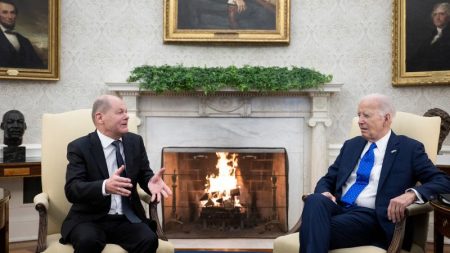Eight years of insults, incitement and affronts to the rule of law have proved that Donald Trump won’t be tamed.
Yet some of his supporters are still pleading for the criminally convicted and twice-impeached ex-president to rein in his wildest impulses or risk losing the 2024 election.
Hoping to sharpen Trump’s focus, his campaign is setting him up with a new menu of policy speeches, town halls and rallies in battleground states as he struggles to find traction in the transformed race against Kamala Harris, CNN has reported.
This week, Trump will swing through Michigan, Pennsylvania and Wisconsin, the critical “blue wall” states that hold the key to November’s election. The adjusted strategy follows the success of the Democratic National Convention last week and Harris’ disciplined start to her optimistic campaign, which threatens Trump’s White House comeback bid more than the one President Joe Biden shelved amid concerns about his age. Trump’s stepped-up pace reflects the new urgency of the compressed sprint until November’s election and is designed to reposition the ex-president before his debate showdown with Harris on September 10.
Trump’s campaign team and closest supporters are trying to convince him that his hopes lie in a more serious approach.
One of Trump’s top congressional allies, Sen. Lindsey Graham, warned Sunday on “State of the Union” that the new upbeat Democratic message of hopeful change offered an opening for Trump. “This whole joy, love fest doesn’t exist in the real world,” Graham told CNN’s Jake Tapper, following up with a snappier electoral argument than Trump has yet managed. “The world is on fire. Your grocery bill is up. Your gas bill is up. Your mortgage payments are up. And the worst is yet to come if you reelect these people yet again.” The South Carolina Republican, perhaps hoping Trump was watching, added: “Compare what you did as president to the life we’re leading now and offer people some hope that change is coming.”
Graham’s commentary illustrated the political purgatory long endured by many top Republicans. To remain politically viable, they must pay homage to the ex-president because of his grip on the party’s base. But they also often fret that his outlandish behavior hurts the Republican case and brand, as well as Trump’s own chances of victory.
Republicans who want Trump to moderate are always disappointed. The ex-president has littered his near-decade in presidential politics with lies and falsehoods. The only thing to which he’s been consistently true is himself. Vengeance, bluster, self-promotion and threats have been his engines of notoriety for decades. This approach helped get him elected in 2016, as he tapped into resentment against political, media, cultural and business elites — and rocked Washington. So when Trump’s backers beseech him to behave in a more temperate way by avoiding raging social media screeds or personal attacks, they are not only asking him to suppress part of himself. They are also seeking to neuter some of his core political tactics.
GOP campaign experts are frustrated because the path to victory against a vice president of an unpopular administration seems obvious — talk about the issues that voters care about most and on which Republicans are favored, including high grocery prices and concerns about the southern border. It’s not that the ex-president cannot talk policy. But his policy points get drowned out by his histrionics and unhinged social media posts.
Trump has heard the critiques. But he didn’t seem convinced at a boisterous event in Arizona on Friday. As usual at a rally, he tried out attacks and slights, then monitored his crowd for their response like a jazz musician improvising around a familiar tune. He complained bitterly about the attacks on his character by Harris, the Obamas and others at the Democratic convention last week, then polled his supporters on whether he should accept his advisers’ advice to turn the other cheek.
In a mocking voice, Trump said, “They say to me, ‘Sir … please stick to policy, don’t stick to personality. You should be nice to people, sir.’” He went on, “I call them up, my geniuses, they get paid a fortune — actually not that much … but I call up my people and say, ‘They are knocking the hell out of me and you say I shouldn’t get personal. But I am going to do my best.’”
One reason those advisers are concerned is that the former president is walking into a trap. Sure, Trump’s rage and revolt helped him win the 2016 election against Democratic nominee Hillary Clinton. But his cultivation of chaos contributed to his disastrous management of the Covid-19 pandemic, which contributed to his being booted out of office after a single term.
Harris last week made a significant tactical adjustment to her party’s anti-Trump strategy after months of Biden making the more abstract case that the Republican nominee is a threat to the nation’s soul and democracy.
Her tone shift involved former Presidents Barack Obama and Bill Clinton lampooning their fellow ex-president as a figure of ridicule. Then Harris closed the trap with a line in her convention speech: “Trump is an unserious man. But the consequences … of putting Donald Trump back in the White House are extremely serious.”
In hindsight, the ex-presidents seemed to be goading Trump into a reaction that would validate the second part of Harris’ statement. And as usual, he delivered, with his frantic social media posts during her speech and extreme improvisations to his remarks in Arizona.
Harris’ overarching campaign theme is “We won’t go back” — to the anger and the pandemonium and the self-obsession of the Trump White House years. So when Trump ignites in an outburst, he reminds voters of those days. The vice president is betting that the nation is ready to “move forward.” Harris said in her convention speech Thursday that “our opponents in this race are out there every day denigrating America, talking about how terrible everything is,” while offering an alternative path of “freedom, opportunity, compassion, dignity, fairness and endless possibilities.”
Contrary to Graham’s argument about the country not being ready for joy, Harris senses that America is primed for optimism after a period marked by Trump’s constant jarring of the national psyche, the pandemic, and economic challenges that have eroded a sense of security for many working- and middle-class citizens. Like many other American leaders through history, she’s offering herself as a vessel for peoples’ hopes, seeking to galvanize a bottom-up movement for change.
But despite delighting Democrats, Harris is under pressure to keep her largely error-free rollout on track to prolong her political honeymoon.
“I know we are going to have bad days. Campaigns have bad days. But the fact that we haven’t had one in 30 days is nuts,” Democratic Sen. Brian Schatz of Hawaii said Friday. “Only the paranoid survive in politics. And so, my own judgment is that we have to turn that momentum into action over the next couple of weeks.”
That will become harder as Harris moves from the scripted safety of her convention and rallies to the debate with Trump on September 10, now looming as the most critical moment in a public career that has sometimes been hindered by her inability to nimbly respond to policy questions.
While the Trump campaign warned this weekend that it expected Harris, who has erased Biden’s polling deficits in swing states and nationally, to get a further bounce coming out of the convention, the race remains very tight.
The election is developing into a grind for every single vote in the decisive swing states. While this will test Harris’s capacity to prolong her political honeymoon, it will also raise the heat on her opponent to show he can concentrate and deliver a disciplined message.
The coming weeks will show whether Trump’s hunch about how to win in November is correct, or whether the divisive showmanship that landed him in the White House eight years ago could be his downfall this time.
Read the full article here













